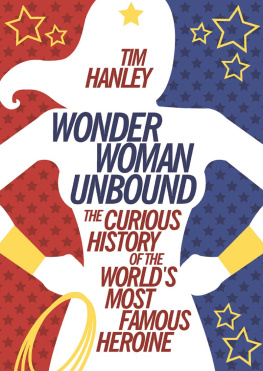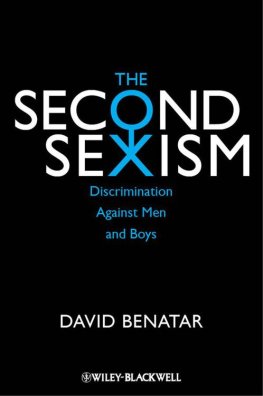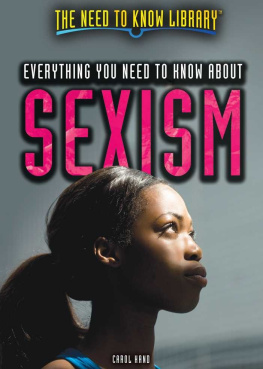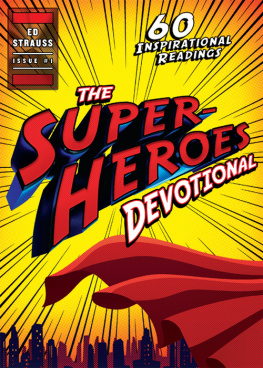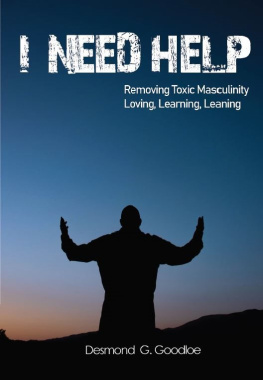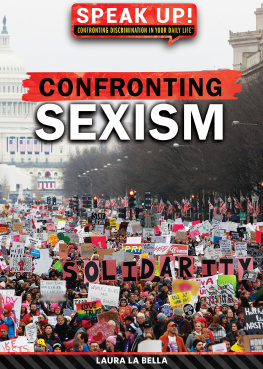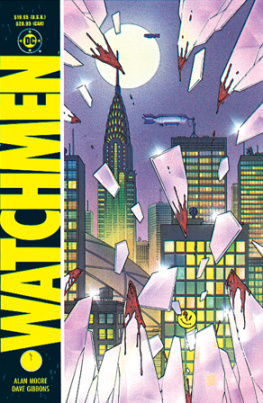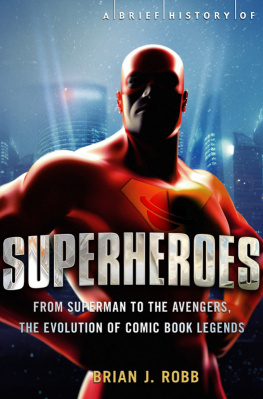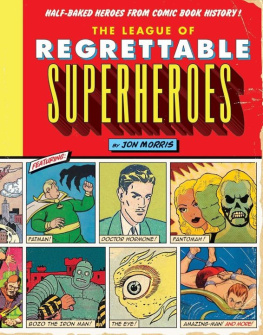Tim Hanley is a comic book historian and the author of Wonder Woman Unbound, Investigating Lois Lane, The Many Lives of Catwoman, and Betty and Veronica: The Leading Ladies of Riverdale. His work has also appeared in the Atlantic, Los Angeles Review of Books, and the Comics Journal. He lives in Halifax, Nova Scotia, between his massive stacks of comic books.
This was a big book. A normal length, yeah, but expansive for someone used to deep dives on particular characters. As such, I drew from a lot of different places.
All the charts and data came from information gathered on a variety of fan-run websites. The Grand Comics Database (comics.org) is unparalleled for comic book credits, Mikes Amazing World of Comics (mikesamazingworld.com) was instrumental for understanding what came out when, and the DC (dc.fandom.com) and Marvel (marvel.fandom.com) Database Wikis proved a great resource for credits, first appearances, and similarly finicky and obscure details. Without all of this excellent data, Id still be thumbing through back issues trying to figure out when Terra first appeared or when Ms. Marvels lost issues were finally printed.
Given that this was an overview of the superhero genre as a whole, Im indebted to scholars and historians who have studied its past and made it all easily understandable. In particular, Id like to thank Bart Beaty, Les Daniels, Sean Howe, Amy Kiste Nyberg, Trina Robbins, Carol Tilley, Larry Tye, Glen Weldon, and Bradford Wright for their work, though many others have been instrumental as well.
The book transitions from the past to the present, and the comic book news websites that monitor this bizarre industry were pivotal as well. From regular news coverage on sites like Comic Book Resources and Newsarama to in-depth pieces on Comics Alliance (RIP) and The Beat, this record of the genres recent past was extremely helpful. Id also like to single out The Mary Sue, Polygon, and Women Write about Comics for years of thoughtful pieces from unique perspectives.
Big thanks as always to Strange Adventures, the best comic shop in the world, where I get all of my many, many comic books. Everyone at Photofest has been great as well, always keen to track down my weirdly specific requests for images.
Im so glad to be back with the excellent team at Rowman & Littlefield for our second book together. Christen Karniski and Deni Remsberg have been fantastic to work with on the editorial front, and this book has benefitted massively from their involvement. Much appreciation as well for the stellar contributions of Veronica Dove in marketing, Nicole Carty in production, and cover designer Kathi Ha.
My best friend Nicole has to hear about whatever minutia of comic book history Im currently lost in when thinking about it no longer works and I have to talk it out. She always asks smart questions and offers good advice. Plus she tells me what words to use to accurately describe the weird mishmash of outfits male artists tend to put their female characters in.
Thanks to you as well, readers, for going on this weird trip through comic book history with me. Weve only just scratched the surface of sexism and toxic masculinity in superhero media here, honestly. This book could be ten times longer and still not address it all, its so central to the genre as a whole. So many fascinating characters and stories didnt make the cut! But I hope this gave you a taste of the issues at play, and that what you learned will illuminate your future superhero reading and watching.
Finally, all the thanks in the world to my family, who are endlessly supportive of me and my work. My parents are the best, my sister and brother-in-law are also great, and my nieces Lennie and Josie are my favorite people in the whole world, even though they are too adorable and thus extremely detrimental to my writing process. Playing Barbies, building towers, and reading stories are much more important than whatever old comic Im blathering on about, though.
This is a select bibliography of the most important and relevant sources that informed substantial portions of the book. A full, detailed bibliography is available on the authors website, thanley.wordpress.com.
Abad-Santos, Alex. Meet the Woman Whos Taking On the Sexism of the Comic Book Industry and Winning. Vox, October 13, 2014. https://www.vox.com/2014/10/13/6961965/marvel-kelly-sue-deconnick-writer-carol-corps.
Baci, Aria. A Brief Timeline of Harassment and Sexual Assault in the Comics Industry. The Mary Sue, November 29, 2017. https://www.themarysue.com/comics-assault-timeline/.
Beaty, Bart. Fredric Wertham and the Critique of Mass Culture. Jackson: University Press of Mississippi, 2005.
Dean, Michael. Two Sides of Julie the Ladies Man. Comics Journal 259 (April 2004): 22.
Edidin, Jay. Geek Masculinity and the Myth of the Fake Geek Girl. Comics Alliance, November 15, 2012. https://comicsalliance.com/geek-masculinity-and-the-myth-of-the-fake-geek-girl/.
Edidin, Jay, Tyler Kingkade, and Jessica Testa. The Comics Giant behind Wonder Woman Is Accused of Promoting an Editor after Women Accused Him of Sexual Harassment. BuzzFeed, November 10, 2017. https://www.buzzfeednews.com/article/jtes/dc-comics-editor-eddie-berganza-sexual-harassment.
Eisner, Joel. The Official Batman Batbook. Bloomington, IN: AuthorHouse, 2008.
Evanier, Mark. Kirby: King of Comics. New York: Abrams, 2008.
Haller, Duna, and Travis Hedge Coke. The Sounds of Silence: CBLDF and Systemic Toxicity in Comics. Comicwatch, June 25, 2020. https://comic-watch.com/news/the-sounds-of-silence-cbldf-and-systemic-toxicity-in-comics.
Hanley, Tim. The Evolution of Female Readership: Letter Columns in Superhero Comics. In Gender and the Superhero Narrative, edited by Michael Goodrum, Tara Prescott, and Philip Smith, 22150. Jackson: University Press of Mississippi, 2018.
Howe, Sean. Marvel Comics: The Untold Story. New York: Harper, 2012.
Krishna, Rachael. Theres an Online Harassment Campaign Underway against People Advocating for Diversity in Comics. BuzzFeed, March 22, 2018. https://www.buzzfeednews.com/article/krishrach/comicsgate#.ldWr3aDgV6.
Letamendi, Drea. The Psychology of the Fake Geek Girl: Why Were Threatened by Falsified Fandom. The Mary Sue, December 21, 2012. https://www.themarysue.com/psychology-of-the-fake-geek-girl/.
MacDonald, Heidi. How a Toxic History of Harassment Has Damaged the Comics Industry. The Beat, October 1, 2015. https://www.comicsbeat.com/how-a-toxic-history-of-harassment-has-damaged-the-comics-industry/.
Micheline, J.A. Comicsgate Is the Latest Front in the Ongoing Culture Wars. Guardian, September 11, 2018. https://www.theguardian.com/commentisfree/2018/sep/11/poison-comicsgate-racism-misogyny-take-a-stand.
Nyberg, Amy Kiste. Seal of Approval: The History of the Comics Code. Jackson: University Press of Mississippi, 1998.
Ricca, Brad. Super Boys: The Amazing Adventures of Jerry Siegel and Joe Shusterthe Creators of Superman. New York: Macmillan, 2013.
Robbins, Trina, and Catherine Yronwode. Women and the Comics. N.p.: Eclipse Books, 1985.
Tilley, Carol L. Seducing the Innocent: Fredric Wertham and the Falsifications That Helped Condemn Comics. Information & Culture 47, no. 4 (2012): 383413.
Tye, Larry. Superman: The High-Flying History of Americas Most Enduring Hero. New York: Random House, 2012.
Weldon, Glen. The Caped Crusade: Batman and the Rise of Nerd Culture. New York: Simon & Schuster, 2016.
Wertham, Fredric. Seduction of the Innocent



